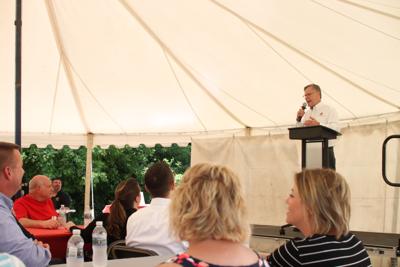by CHRIS ROGERS
One of Winona’s enduring manufacturing successes and a global leader in railroad parts, Miller Ingenuity celebrated its 75th anniversary on June 23. Company leaders and local and state officials heralded the milestone and highlighted the company’s unique approach to technology and management.
Miller Felpax, as Miller Ingenuity was then known, was founded in 1947 by Rudy Miller — the same Miller who co-founded the Fiberite company that would later give rise to RTP. Miller had invented a new felt wick lubricator for train axles, allowing them to be constantly lubricated while running down the tracks. In the decades since then, Miller Ingenuity became a global leader in a number of locomotive parts and branched into rail electronics, weathering economic storms along the way.
“Miller [Ingenuity] has gone through 12 recessions and a pandemic in the last 75 years, and not only did we survive all that, we’re actually stronger,” President and CEO Steve Blue said. “We have a stronger balance sheet today than when the pandemic showed up.”
Given that only a small fraction of businesses survive to see their 12th anniversary, Blue continued, “It’s kind of a big deal that we reached 75. But you have to ask, how is that? How did we manage to not only survive but thrive over 75 years when so many companies didn’t make it that long? I can sum it all up in one word: Our people.”
One of those people is Michael Blank, the company’s director of engineering and quality assurance. Blank has been with Miller Ingenuity for 43 years, starting in production in 1979 as a fresh high school grad. In 1982-83 he was part of a team that developed a new gear case seal for locomotives — an invention that is still in wide use today.
Gear cases hold oil around the gears in locomotive engines, keeping them lubricated, but in the early 80s, gear cases were very leaky, meaning trains spilled oil everywhere they went. As the Miller team set out to change that, Blank said, “There was a lot of trial and error and experimentation.” Blank and his co-workers eventually developed a sort of gutter system to funnel oil back into the gear case and drastically cut down on leakage. “What used to be measured in gallons was measured in teaspoons,” Blue said.
Asked what kept him working at Miller Ingenuity for 43 years, Blank said, “It’s the people. I always liked the bosses that I’ve had, and when Steve came, he really changed the nature of the company [into] a self-directed workforce … You know what you need to do, and he allowed you to do your job.”
Blue recalled once running into some employees offloading a U-Haul truck — a sight more fitting for a newly sold house than a major factory. They explained they had called all over the country to find a needed part in short supply, then hired a U-Haul to bring it to Winona. “I didn’t tell them they could that,” Blue said. “They didn’t ask anyone’s permission to do that. They just did that. And that’s because we have a self-directed workforce.”
Blue continued, “When I got here about a quarter century ago, it was clear to me that some big transformation needed to take place. Our patents were expiring. Competition was on our heels. The equipment in our factory was very old. It wasn’t anybody’s fault; it’s just how these things end up happening over the years. So we started really transforming the entire company into what it is today.”
Miller Ingenuity brought in consultants to train the entire company on the principles of creativity — “not just the white-collar guys — everyone,” Blue said — and in 2014 opened a Creation Station, a space where any employee is free to brainstorm solutions — from small tweaks to streamline production to the next big invention.
As he and Senator Jeremy Miller presented a commendation from the governor, Representative Gene Pelowski talked about how he had toured the factory eight times over the course of his long tenure as a legislator. Every time he visited, the plant was different, with new equipment or a different layout. “Everything here changes, and that’s part of its strength … If you incorporate the employees into your business, good things happen,” Pelowski said.
The manufacturer still makes some of the decades-old parts the business it was founded on, but it has also taken on more high-tech initiatives: lights for railroad crossings, radio communications, and Zone Guard, a sophisticated system of sensors and monitors that warn rail crews of incoming trains. “We’re very unique in that we’ve got low and high-tech products … Most companies are either one or the other,” Blue said.
Referring to Zone Guard and other safety technologies, Blue continued, “Where we’ll be in 25 years from now is we’ll be known as the company that saved all kinds of lives in the rail industry, which is a pretty cool testament, a pretty cool mission statement to have.”







Commented
Sorry, there are no recent results for popular commented articles.